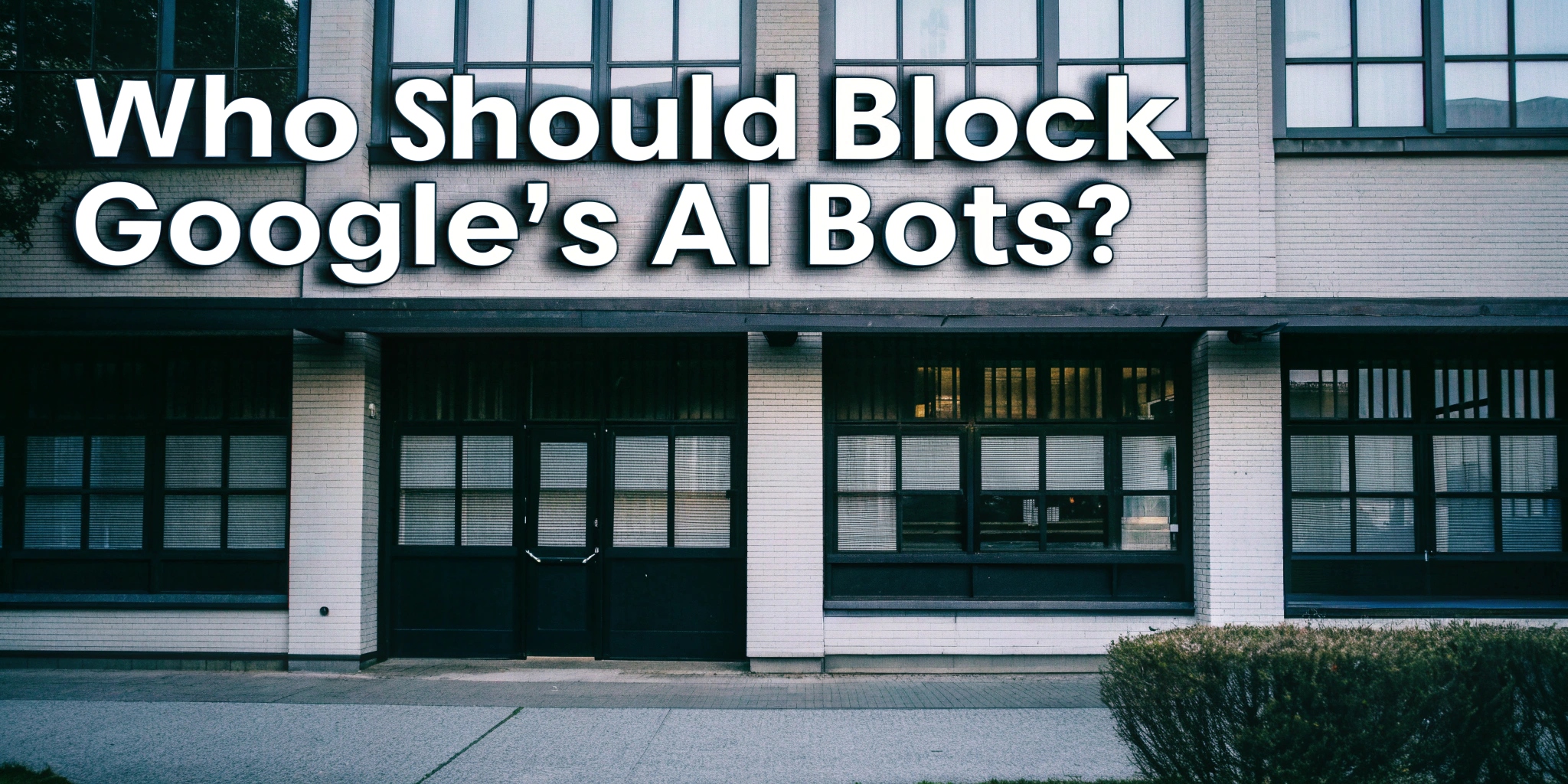In today's digital world, AI bots are everywhere. From powering search engines to helping virtual assistants like Siri or ChatGPT, these bots play a major role in how information is collected and delivered online.
But recently, many websites have noticed more AI bots visiting their pages. These bots crawl websites to gather data, which is later used to train artificial intelligence models or improve search algorithms.
This blog will help you understand who should consider blocking AI bots — and why. We'll explore what AI bots are, how they work, their benefits, and their potential risks. Most importantly, we'll help you decide whether blocking AI bots is the right move for your website.
What Are AI Bots?
AI bots are special software programs that automatically visit websites and collect information from them. They are sometimes called "web crawlers" or "data scrapers." These bots are not human visitors — they don't read your blog or click buttons like a person would. Instead, they quietly go through your web pages, read your content, and save it for other uses.
You may already be familiar with bots like Googlebot, which crawls your website to help it appear in search results. AI bots are similar, but their main job is to collect content that can help train artificial intelligence systems or power AI features in apps and websites.
Here are some common examples of AI bots:
- GPTBot – Created by OpenAI (the company behind ChatGPT). It collects web data to improve how the AI understands and responds to questions.
- CCBot – Run by Common Crawl, this bot collects huge amounts of internet data and makes it available to companies training AI models.
- Google-Extended – This bot helps Google gather data that improves its AI-based features and services.
- PerplexityBot – Used by Perplexity AI, a tool that answers user questions using web content.
These bots don't need permission to crawl most public websites. They simply scan your pages in the background, saving the content they find useful. While some of them follow the rules if you ask them to stop (using a file like robots.txt), others may not — which is why understanding how they work is important for website owners.
Why Do AI Bots Visit Your Website?
AI bots visit websites mainly to collect information that helps improve artificial intelligence systems. They scan web pages and gather data, which is then used to train AI models or power AI-based tools like chatbots and search engines.
Here are some key reasons AI bots crawl your site:
- To Train AI Models: AI systems need large amounts of text data to learn how people use language. By collecting
- To Train AI Models: AI systems need large amounts of text data to learn how people use language. By collecting content from websites, AI bots help train models to understand questions better, provide accurate answers, and generate human-like responses.
- To Power Search and Answer Tools: Many AI-powered search engines and virtual assistants rely on real web content to give users fast and reliable answers. AI bots collect information so these tools can summarize facts, offer recommendations, and improve search results.
- Without Asking Permission: Most AI bots don't request permission before crawling websites. They assume that any publicly accessible content is available for their use. This means they visit your site quietly in the background, often without you knowing.
This behaviour can be a double-edged sword. On one hand, having your content included in AI databases can increase your visibility and attract new visitors. On the other hand, it might cause issues if your content is used without credit or if it reduces direct traffic to your site. Understanding why AI bots visit helps you decide whether to allow or block them based on your website's goals and content type.
Pros of Allowing AI Bots
Allowing AI bots to access your website can bring several important benefits, especially if your goal is to reach a larger audience and grow your online presence. Here's why many website owners choose to let AI bots crawl their content:
More Visibility for Your Content
When AI bots crawl your website, your content may become part of AI-powered search engines, virtual assistants, and answer tools. It means more people can discover your website when they ask questions on
🚀 New Batch Starting Soon!
Don't miss your chance to enroll now.
00 Days00 Hours00 Minutes00 SecondsAI Citations and Backlinks
Some AI tools don't just use your content — they also credit your website by providing links back to your pages. It is great for driving traffic and improving your site's authority. When an AI-powered answer includes a link to your site, curious users are more likely to click through and read more, increasing your engagement and potential customers.
Helps with SEO and Online Presence
Allowing AI bots to crawl your site can also indirectly help your SEO (Search Engine Optimization). When AI tools index your site's high-quality, original content, it can improve your ranking in traditional search engines like Google. It is because AI tools often help shape how search engines understand and prioritize information.
Who Benefits the Most?
Websites like educational blogs, nonprofits, startups, or businesses looking to build brand awareness often gain a lot from this exposure. By welcoming AI bots, they open new doors for discovery and growth in the ever-expanding digital world.
Risks and Downsides of AI Bots
While there are some benefits to letting AI bots access your website, there are also several important risks you should consider. Not every site will benefit from AI bot traffic, and in many cases, it can even hurt your site's performance or business goals.
Content May Be Used Without Credit
One of the biggest concerns is that your content might be copied and used by AI tools without giving you credit. Not all AI bots provide backlinks or mention your site. Your original blog posts, articles, or product descriptions could be quoted or summarized without your name attached.
Drop in Website Traffic
When AI tools like ChatGPT or Perplexity answer questions using your content, users might not feel the need to visit your website. It can lead to a drop in page views and fewer opportunities to earn ad revenue, build an audience, or sell products.
Copyright and Legal Issues
If your content is protected by copyright, having it scraped without permission can raise legal and ethical issues. You may lose control over how your content is used or presented elsewhere.
Privacy and Sensitive Data Risks
Some websites include private or exclusive information — like members-only articles or internal research. AI bots may access and store this data without your knowledge.
Server Load and Speed Issues
AI bots can cause extra traffic to your server, slowing down your website for real visitors. It can affect user experience and even harm your SEO rankings.
Because of these concerns, many website owners are now reconsidering whether or not to allow unrestricted access to AI bots.
Who Should Block AI Bots?
Blocking AI bots isn't always necessary, but in some cases, it's a smart move. Here are the types of websites that should seriously consider it:
Publishers and News Websites
News sites rely on advertising revenue that comes from page views. If AI bots scrape their content and provide summaries or quotes elsewhere, users might not click on the source.
Why block AI bots?
- To protect revenue from ads
- To prevent unauthorized use of copyrighted content
- To retain control over how stories are distributed
Content Creators and Bloggers
If you're a blogger, writer, or content creator, your work is your intellectual property. You might not want AI tools using your posts without credit or permission.
Why block AI bots?
- To protect original creative content
- To avoid your blog being quoted without backlinks
- To maintain ownership of your ideas
Membership and Subscription Sites
Sites that offer paid content, like premium articles, exclusive reports, or online communities, should block AI bots to keep their content secure.
Why block AI bots?
- To protect paywalled or private content
- To avoid giving away valuable information for free
- To respect user privacy and subscription terms
Educational Platforms
If you run a site that sells online courses, certifications, or proprietary educational materials, AI bots might copy your unique content.
Why block AI bots?
- To protect course content and research
- To stop AI tools from repackaging your material
- To keep your paid resources exclusive
Small Businesses with Unique Content
Some small businesses publish unique articles, product guides, or technical documentation. If AI tools take that information, competitors might benefit.
Why block AI bots?
- To stop competitors from learning from your content
- To protect your brand's voice and expertise
- To control how your business is represented online
Who Might Not Need to Block AI Bots?
Not every website needs to block AI bots. In fact, some websites can benefit by allowing AI bots to access their content. If your goal is to increase visibility, grow your audience, or share open information, AI bots can actually help you.
For example, an educational platform offering a digital marketing course in Jaipur may benefit from this exposure. AI tools that quote or link to your website can introduce your content to new learners who might not have found you otherwise.
Open-Source and Public Data Projects
If your website shares open-source code, public datasets, or free educational resources, AI bots can help spread your mission. AI tools may use your content to educate others, and in return, more people might discover your work.
Startups, Nonprofits, and Educators
New businesses, nonprofit organizations, or educators looking to grow their brands often welcome AI bot traffic. When AI tools summarize or link to your content, it can introduce your website to new users who may not have found you otherwise.
Websites That Get Credit and Backlinks
Some AI tools include source links when quoting your website. These backlinks can boost your SEO, bring more traffic, and increase your site's authority in search engine rankings. If you're seeing referral traffic from AI tools, it may be worth continuing to allow their bots.
Should You Allow AI Bots?
If your website offers free content and your main goal is brand awareness, community support, or knowledge sharing, then allowing AI bots may help you reach wider audiences.
However, your decision should align with your SEO goals. If you're unsure, consider working with a reliable agency that offers SEO services in Jaipur. They can help create a strategy that protects your content and improves visibility on search engines and AI platforms alike.
How to Block AI Bots
If you decide to block AI bots, you can do it easily using the robots.txt file on your website. This file tells bots which pages they are allowed to access.
Simple Explanation:
The robots.txt file is a text file that sits in the root directory of your website (e.g., www.yoursite.com/robots.txt). You can add rules to block certain bots.
Sample Code to Block Common AI Bots:
User-agent: GPTBot
Disallow: /
User-agent: CCBot
Disallow: /
User-agent: Google-Extended
Disallow: /
User-agent: ClaudeBot
Disallow: /
User-agent: PerplexityBot
Disallow: /
Each section tells a specific bot not to crawl your site.
Tools and Plugins:
- WordPress Plugins: Some SEO and security plugins (like RankMath or Yoast) allow you to edit the robots.txt file directly.
- Cloudflare Bot Control: If you use Cloudflare, you can block unwanted bots through firewall settings.
- Server Rules: Advanced users can set up blocking rules on Apache or NGINX servers.
Note: Blocking bots via robots.txt is a request — ethical bots will obey, but some may ignore it. For stronger protection, you can use server-level restrictions.
Conclusion
Deciding whether to block AI bots depends on your website's goals and the type of content you offer. There's no right or wrong answer — it's about what works best for you.
If your main priority is to protect your original content, maintain copyright control, or keep exclusive data safe, then blocking AI bots is a smart move. It is especially important for news publishers, bloggers, educational platforms, and membership-based websites. Blocking bots can help prevent your work from being copied, reused without credit, or made freely available by AI tools.
On the other hand, if your goal is to reach more people, grow your brand, and get discovered through AI-powered platforms, then allowing bots might be helpful. AI tools can increase your content's visibility and possibly send traffic back to your website, especially if they include links or citations.
In the end, every website is different. You should take time to think about your content strategy, SEO plans, and business goals. Review how your content is being used and decide what's best for your audience and your brand.



